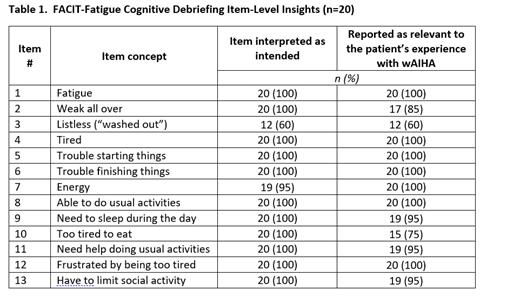Introduction: Warm autoimmune hemolytic anemia (wAIHA) is a rare, life-threatening autoimmune disorder caused by autoantibodies that bind to and prematurely destroy red blood cells. Patients with wAIHA can experience acute worsening of anemia which can be a medical emergency and have an increased risk of thromboembolic events and premature death. Fatigue is the primary patient-reported symptom for many individuals living with wAIHA. The patient-reported Functional Assessment of Chronic Illness Therapy-Fatigue (FACIT-Fatigue) scale is supported by robust psychometric evidence and has been used to support efficacy assessments of improvement in anemia-related fatigue. However, evidence of content validity of this scale has not been established in the wAIHA patient population. The objective of this research was to examine whether the FACIT-Fatigue is fit for purpose to assess wAIHA-related fatigue.
Methods: Twenty hybrid concept elicitation/cognitive debriefing interviews were conducted with adults living with wAIHA across two sequential studies. All participants were recruited from the United States via research partners following IRB approval. The studies aimed to understand the symptoms and impacts of wAIHA on participants' daily lives with a specific focus on fatigue and to evaluate the FACIT-Fatigue scale in a wAIHA patient population. The last 10 interviews also included a qualitative evaluation of meaningful change on the FACIT-Fatigue individual items. Interviews were recorded and transcribed verbatim, and data were coded. Content and descriptive analysis methods were used to examine data at the item and participant level. Thematic analysis was conducted to identify emerging patterns across items and participants and to identify key constructs from concept elicitation.
Results: Interview participants were primarily non-Hispanic white (n=16, 80%), female (n=11, 55%), and had a mean age of 47.5 ± 14.7 years. Fatigue was reported as a core symptom of wAIHA by all participants. Several participants noted that fatigue was their most bothersome symptom. Participants summarized the extensive impact fatigue had on their daily functioning, including reduced ability to work or volunteer, disruptions to their social lives, and negative changes to their emotional wellbeing. Cognitive debriefing affirmed that the instructions and items comprising the FACIT-Fatigue were well understood and relevant to their experiences with wAIHA, the 7-day timeframe was easy to recall, and participants were easily able to rate their experiences using the response scale (see Table 1 for item-level insights).The majority of participants who were asked about meaningful change identified a 1-point change as meaningful for each of the FACIT-Fatigue items. Analysis of participants' perspectives on meaningful changes at the item level indicated that a 3 point change in the total score would be meaningful for all participants. This aligns with previous studies that have published meaningful change thresholds of 3-6 points on the FACIT-Fatigue total score in populations with chronic conditions that cause fatigue.
Conclusions: Fatigue is a debilitating symptom of wAIHA which impacts functioning across multiple domains. The content validity of the FACIT Fatigue scale is well supported by the results of the qualitative interviews as its items capture constructs that are relevant to evaluating fatigue and important to people living with wAIHA. These research findings support the use of the FACIT-Fatigue scale in clinical trials of treatments for wAIHA and suggest that a 3-point change of the total score would represent meaningful change in this patient population. Future work will focus on evaluating the psychometric properties of the FACIT-Fatigue scale in a wAIHA population.
Disclosures
Scippa:Janssen Pharmaceuticals: Current Employment; Gilead Sciences, Inc.: Current equity holder in publicly-traded company; Novartis AG: Current equity holder in publicly-traded company. Mangrum:Vector Psychometric Group, LLC: Current Employment. Martin:RTI Health Solutions: Current Employment. Cueto:Janssen Pharmaceuticals: Current Employment. Bryant:Vector Psychometric Group, LLC: Current Employment. Schantz:Vector Psychometric Group, LLC: Current Employment. Pease:Janssen Pharmaceuticals: Current Employment; Pfizer: Current equity holder in publicly-traded company, Current holder of stock options in a privately-held company.


This feature is available to Subscribers Only
Sign In or Create an Account Close Modal